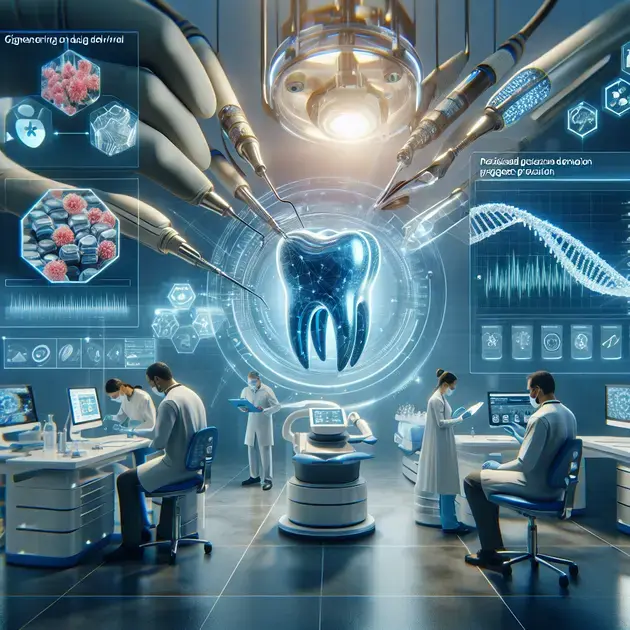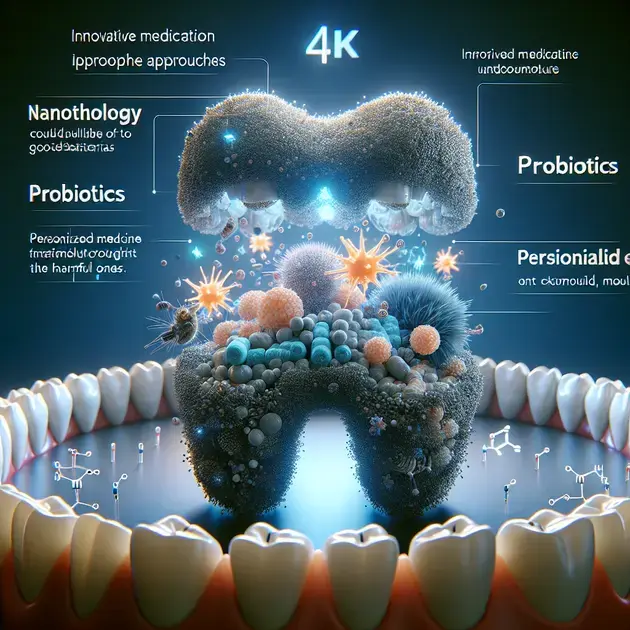Periodontitis is a common dental condition that affects millions of people worldwide. In this comprehensive guide, we will discuss the most effective medication options available for treating periodontitis and maintaining oral health.
Recent studies have shown that a combination of antibiotics and non-surgical treatments such as scaling and root planing can effectively manage periodontitis and prevent its progression. Understanding the various medications and their benefits is crucial for finding the best treatment plan for each individual.

Understanding Effective Medication Options
When it comes to understanding effective medication options for treating periodontitis, it is important to consult with a dental professional. One common medication prescribed for this condition is an antimicrobial mouth rinse, such as chlorhexidine. This rinse can help reduce bacteria in the mouth and promote healing of the gums. To use this rinse effectively, follow your dentist’s instructions carefully on the frequency and duration of use.
Another medication option is oral antibiotics, which may be prescribed in more severe cases of periodontitis. These antibiotics work systemically to combat bacteria throughout the body. It is crucial to take the full course of antibiotics as prescribed by your dentist or healthcare provider to ensure effectiveness and reduce the risk of antibiotic resistance.
For localized treatment, your dentist may also recommend an antibiotic gel or chip that is placed directly into the gum pockets. This targeted approach helps deliver the medication directly to the affected area for better efficacy. Follow your dentist’s advice on how to use these products correctly for optimal results.
In addition to prescribed medications, maintaining good oral hygiene practices such as regular brushing, flossing, and dental cleanings is essential for managing periodontitis effectively. Combining medication with proper oral care can help improve the condition of your gums and overall oral health.
Benefits of Antibiotics in Treating Periodontitis
Antibiotics play a crucial role in the treatment of periodontitis by targeting and eliminating harmful bacteria that cause gum disease. One of the main benefits of using antibiotics is their ability to reach areas in the mouth that may be difficult to clean through regular oral hygiene practices alone. This can help reduce inflammation, infection, and progression of periodontal disease.
Certain antibiotics, such as penicillin, tetracycline, or metronidazole, are commonly prescribed for treating periodontitis. These antibiotics work by inhibiting the growth of bacteria and promoting healing of the gums. It is important to follow the recommended dosage and duration of antibiotic treatment to maximize their benefits and minimize side effects.
In some cases, a dentist may prescribe a combination of antibiotics to target different strains of bacteria more effectively. This tailored approach can lead to improved outcomes and better control of the infection. However, it is essential to inform your dentist about any allergies or medical conditions before starting antibiotic treatment.
While antibiotics can be beneficial in managing periodontitis, they are typically used in conjunction with other treatments such as scaling and root planing or surgical interventions for more severe cases. Your dentist will create a personalized treatment plan that may include antibiotics to help you achieve optimal oral health.
Non-Surgical Treatments for Managing Periodontitis
Non-surgical treatments are often the first line of defense in managing periodontitis before considering more invasive procedures. One common non-surgical approach is scaling and root planing, also known as deep cleaning. During this procedure, your dentist or dental hygienist will remove plaque and tartar from the tooth surfaces and root surfaces to promote healing of the gums.
Another non-surgical treatment option is the use of dental lasers to target and eliminate bacteria in the gum pockets. Laser therapy can help reduce inflammation, remove diseased tissue, and promote gum tissue regeneration. This minimally invasive technique can lead to faster healing and less discomfort compared to traditional surgical methods.
Antimicrobial mouth rinses and local antibiotic treatments are also considered non-surgical interventions for managing periodontitis. These products can help reduce bacteria in the oral cavity and prevent the progression of gum disease. Using these treatments as directed by your dentist can complement your oral hygiene routine and improve the condition of your gums.
It is essential to attend regular dental check-ups and cleanings to monitor the progress of your periodontal health and adjust your treatment plan as needed. By combining non-surgical treatments with good oral hygiene practices, you can effectively manage periodontitis and prevent potential complications in the future.

Effective Medication Options for Periodontitis: A Deep Dive
When it comes to tackling periodontitis, exploring effective medication options is crucial for successful management. Medications can play a significant role in controlling the progression of this gum disease and promoting oral health. Among the various medication options available, antibiotics are commonly prescribed to combat the bacteria responsible for periodontitis. These antibiotics can be taken orally or applied directly to the affected areas, providing localized treatment.
In addition to antibiotics, antimicrobial mouth rinses are another medication option for periodontitis. These rinses contain active ingredients that target and eliminate harmful bacteria in the mouth, reducing inflammation and preventing further deterioration of gum tissues. For individuals with moderate to severe periodontitis, combining antibiotics with antimicrobial rinses may offer enhanced results in managing the condition.
Furthermore, anti-inflammatory medications such as ibuprofen can help alleviate pain and swelling associated with periodontitis. These medications can be used in conjunction with other treatments to address discomfort and support the healing process. By reducing inflammation, anti-inflammatory drugs contribute to overall gum health and comfort for individuals with periodontal disease.
In some cases, host modulation therapy may be recommended as a medication option for periodontitis. This approach focuses on modifying the body’s response to bacteria in the oral cavity, ultimately reducing the destructive effects of gum disease. By targeting the host response, medications used in host modulation therapy can help regulate inflammation and support the healing of gum tissues.
Effective medication options for periodontitis should always be prescribed by a dental professional after a thorough evaluation of the individual’s oral health needs. By incorporating the right medications into a comprehensive treatment plan, patients can experience improved gum health and better management of periodontal disease.
Innovative Approaches to Treating Periodontitis with Medication
As advancements continue to emerge in the field of dentistry, innovative approaches to treating periodontitis with medication offer new possibilities for patients. One innovative method involves the use of local delivery antibiotics, where medications are directly administered to the periodontal pockets affected by bacteria. This targeted approach enhances the effectiveness of antibiotics in combating infection and promoting gum healing.
Another innovative approach to medication in periodontitis management is the utilization of probiotics. Probiotics, or beneficial bacteria, can help restore a healthy balance in the oral microbiome, reducing the growth of harmful bacteria associated with gum disease. By incorporating probiotic supplements or foods into a treatment regimen, individuals with periodontitis may support oral health from within.
Nanotechnology presents yet another innovative avenue for medication in periodontitis treatment. Nanoparticles loaded with antimicrobial agents can efficiently target and eliminate bacteria in the oral cavity, offering a powerful weapon against periodontal pathogens. This advanced delivery system maximizes the benefits of medications while minimizing potential side effects.
Furthermore, personalized medicine is revolutionizing the approach to periodontitis treatment by tailoring medication regimens to individual genetic factors and oral microbiota composition. This precision medicine approach ensures that patients receive the most effective and personalized treatment for their specific condition, leading to better outcomes and long-term oral health.
By exploring these innovative approaches to treating periodontitis with medication, individuals can access cutting-edge solutions that target the root causes of gum disease and support overall oral health and wellness.
Maximizing the Benefits of Medication in Periodontitis Management
Optimizing the benefits of medication in periodontitis management requires a comprehensive and tailored approach to treatment. Alongside prescribed medications, maintaining good oral hygiene practices is essential in maximizing the effectiveness of the treatment plan. Regular brushing, flossing, and professional cleanings help create an environment conducive to healing and prevent further progression of periodontal disease.
Education and awareness play a critical role in empowering individuals to make informed decisions about their oral health and medication regimen. Understanding the purpose and potential side effects of prescribed medications enables patients to adhere to the treatment plan and achieve optimal results. Open communication with dental providers is key in addressing any concerns or questions regarding medications for periodontitis.
Monitoring the progress of periodontitis treatment is fundamental in assessing the efficacy of the prescribed medications. Regular dental check-ups and evaluations allow for adjustments to the medication regimen as needed, ensuring that patients are on the right track towards improved gum health. Tracking improvements in gum condition and overall oral health provides motivation and reinforces the importance of medication compliance.
Healthy lifestyle choices such as a balanced diet and avoiding tobacco products can further enhance the benefits of medication in periodontitis management. Nutrient-rich foods support gum tissue health and overall immune function, aiding in the body’s natural ability to combat periodontal disease. By prioritizing a healthy lifestyle, individuals can amplify the effects of medications and promote long-term oral wellness.
In conclusion, by implementing a holistic approach that combines medication, oral hygiene practices, patient education, regular monitoring, and healthy lifestyle habits, individuals can truly maximize the benefits of medication in managing periodontitis and achieving lasting oral health outcomes.
Conclusion
In summary, effective medication options for periodontitis are essential in managing this gum disease and promoting oral health. Antibiotics, antimicrobial mouth rinses, anti-inflammatory medications, and host modulation therapy are all crucial in controlling the progression of periodontitis and supporting the healing process. By working closely with dental professionals to determine the right medications for individual needs, patients can significantly improve their gum health and overall well-being.
Furthermore, innovations in treating periodontitis with medication offer exciting possibilities for patients. From targeted delivery of antibiotics and the use of probiotics to nanotechnology and personalized medicine approaches, individuals now have access to cutting-edge solutions that address the root causes of gum disease. These advancements pave the way for more effective and personalized treatment regimens that can lead to better outcomes and long-term oral health.
To maximize the benefits of medication in periodontitis management, a comprehensive approach is necessary. In addition to prescribed medications, maintaining good oral hygiene practices, staying informed about medication regimens, regular monitoring of treatment progress, and adopting a healthy lifestyle all play key roles in enhancing the effectiveness of the treatment plan. By integrating these components into a holistic approach, individuals can optimize the benefits of medication, achieve lasting oral health outcomes, and enjoy a better quality of life.



